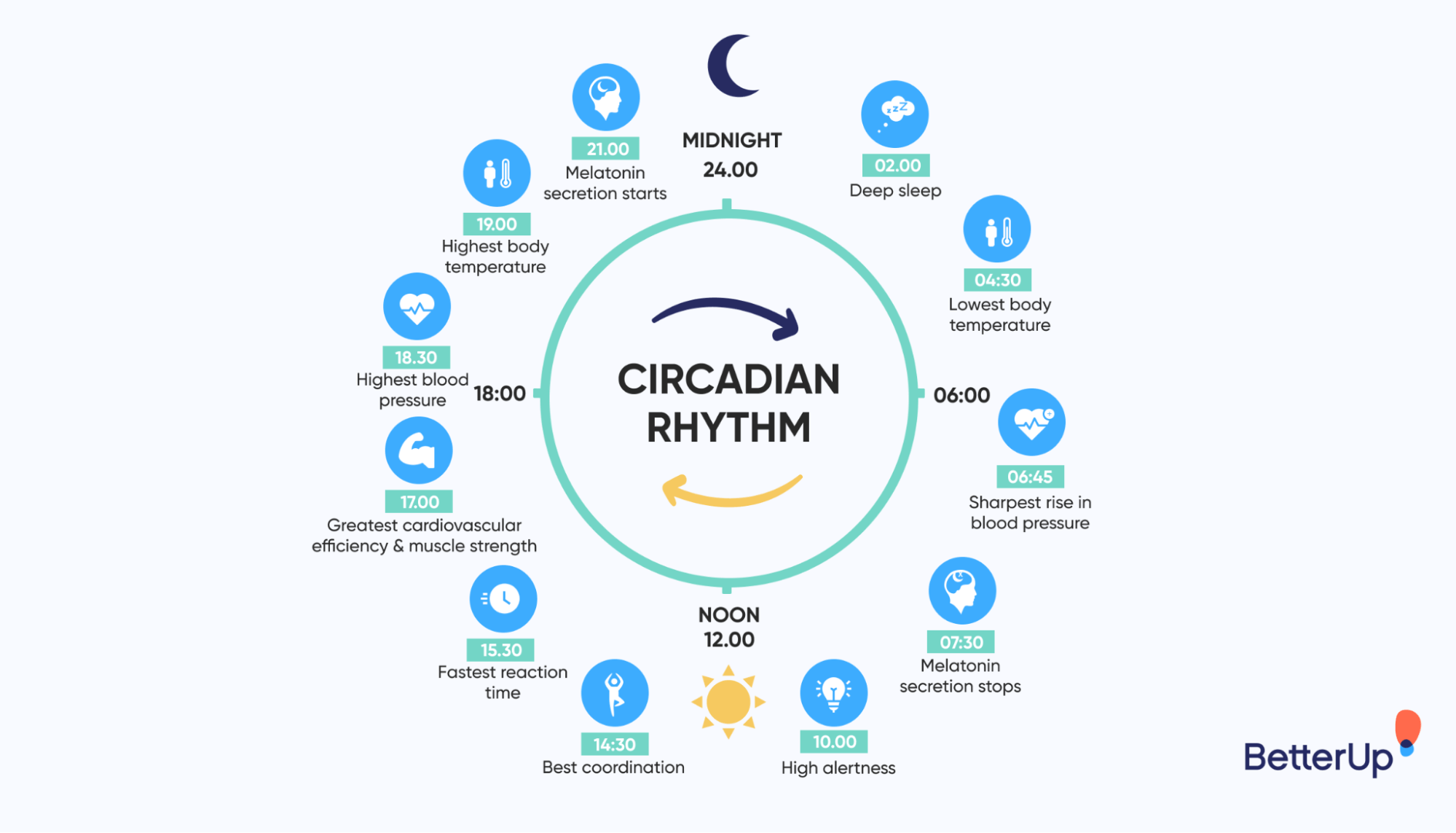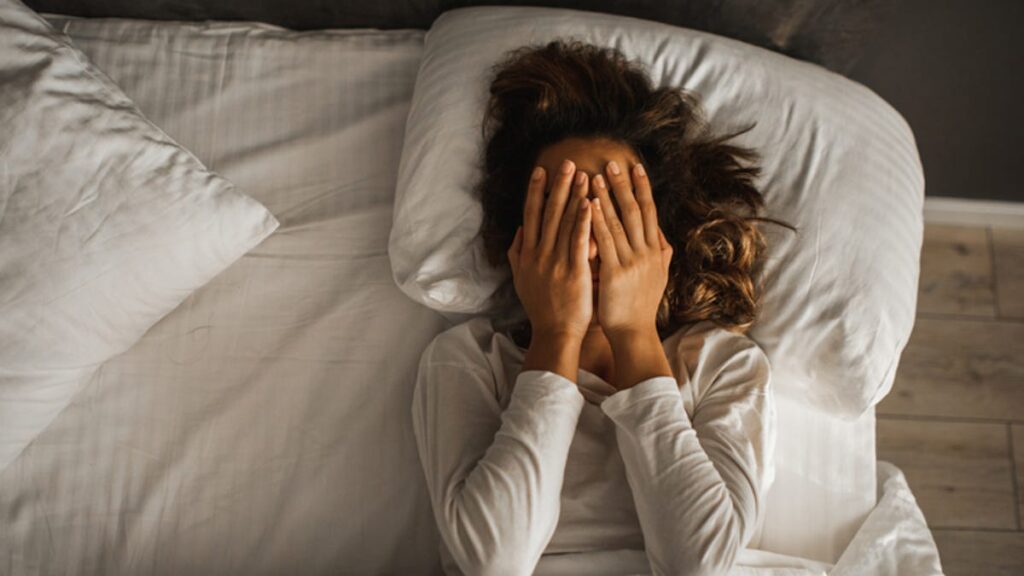How to Sync Your Circadian Rhythms for Peak Performance

Did you know that nearly 87% of people experience a misalignment in their circadian rhythms, affecting their daily performance?
Syncing your circadian rhythms can be a gamechanger for achieving peak performance in your personal and professional life. Your circadian rhythm, often referred to as your internal body clock, regulates sleepwake cycles, hormone release, and other essential bodily functions.
When these rhythms are out of sync, it can lead to fatigue, decreased productivity, and even health issues.
This guide will delve into the science behind circadian rhythms and provide practical tips to help you align your internal clock for optimal energy, focus, and well-being.
From adjusting your light exposure to fine-tuning your daily habits, discover how syncing your circadian rhythms can enhance your overall performance and quality of life.
Table of Contents
Understanding Circadian Rhythms: The Basics

Circadian rhythms are innate, internal biological processes that regulate our sleep-wake cycles, alertness, and other physiological functions over a 24-hour period. These rhythms are controlled by a master clock in the brain called the suprachiasmatic nucleus (SCN), which is influenced by environmental cues such as light and darkness.
The timing of our circadian rhythms is crucial for optimal health and performance. When our internal clock is in sync with our external environment, we experience higher levels of energy and productivity throughout the day. However, disruptions in our circadian rhythms can lead to a variety of negative effects, including sleep disturbances, fatigue, and decreased cognitive functioning. It is therefore essential to understand the basics of circadian rhythms and how they impact our daily lives.
The Impact of Circadian Rhythms on Performance
Circadian rhythms play a fundamental role in our daily lives, influencing everything from our sleep-wake cycles to our cognitive and physical performance. These natural rhythms, regulated by the body’s internal clock, have a profound impact on our overall well-being. Understanding the importance of circadian rhythms in relation to performance is crucial for individuals striving to optimize their productivity and achieve peak mental and physical abilities.
Research has consistently shown that disruptions in circadian rhythms can have significant implications for performance. When our bodies experience a misalignment between our internal clocks and external cues, such as light exposure and sleep schedules, it can lead to decreased alertness, impaired cognitive function, reduced physical coordination, and increased risk of accidents. One study found that individuals working night shifts, which can disrupt natural circadian rhythms, demonstrated a decline in performance on tasks requiring attention, memory, and problem-solving skills. These findings highlight the critical role that circadian rhythms play in our ability to perform optimally in various domains of life.
Identifying Signs of Disrupted Circadian Rhythms
- The body’s circadian rhythms regulate various physiological functions:
- Sleep-wake cycle
- Hormone production
- Metabolism
- Disrupted circadian rhythms can impact overall health and well-being.
- Identifying signs of disrupted circadian rhythms:
- Difficulty falling asleep or staying asleep (insomnia)
- Daytime sleepiness
- Fluctuations in energy levels throughout the day
- Excessive tiredness in the morning
- Alertness late at night
- Negative impacts of irregular energy levels:
- Reduced productivity
- Decreased overall performance
Establishing a Consistent Sleep Schedule

Maintaining a consistent sleep schedule is crucial for optimizing your circadian rhythms and ensuring optimal performance during the day. When it comes to establishing a consistent sleep schedule, there are several key factors to consider.
Firstly, it is important to prioritize the duration of your sleep. The National Sleep Foundation recommends that adults aim for 7 to 9 hours of quality sleep per night to support overall health and well-being. Establishing a consistent bedtime and wake-up time can help regulate your internal body clock and promote better sleep quality.
In addition to the duration, the timing of your sleep is equally important. Our bodies are naturally attuned to a 24-hour cycle, which is influenced by external cues such as light exposure. By going to bed and waking up at around the same time every day, you can synchronize your body’s internal clock with the external environment, making it easier to fall asleep and wake up refreshed.
Creating a relaxing pre-sleep routine can also aid in establishing a consistent sleep schedule. Engaging in activities such as reading a book, taking a warm bath, or practicing relaxation techniques like deep breathing can help signal to your body that it’s time to wind down and prepare for sleep.
By implementing these strategies and committing to a consistent sleep schedule, you can set the stage for optimal sleep and pave the way for better performance and well-being throughout your day.
Creating an Optimal Sleep Environment
Creating an optimal sleep environment is crucial for promoting high-quality sleep and supporting overall well-being. One key factor in establishing an ideal sleep environment is maintaining a comfortable temperature. Research suggests that a cooler room temperature, around 60 to 67 degrees Fahrenheit (15 to 19 degrees Celsius), can aid in falling asleep faster and experiencing deeper sleep throughout the night. It is important to find a temperature that suits your individual preferences and ensures a cozy and conducive sleep environment.
In addition to temperature, the quality of your sleep environment plays a significant role in promoting restful sleep. Investing in a supportive mattress and comfortable bedding can greatly enhance your sleep experience. A mattress that provides proper support for your body’s natural alignment and a pillow that suits your sleep position can help alleviate discomfort and reduce the chances of waking up with aches and pains. Additionally, choosing breathable and hypoallergenic bedding materials can prevent potential irritations and allergies that may disrupt sleep. By creating a sleep environment that caters to your comfort and individual needs, you can optimize your chances of experiencing deep and restorative sleep each night.
The Role of Light Exposure in Syncing Circadian Rhythms
Light exposure plays a crucial role in synchronizing our circadian rhythms, the internal clock that regulates our sleep-wake cycle and other physiological processes. Our bodies are designed to respond to natural light cues, and exposure to light at specific times of the day has a profound impact on our overall well-being.
One of the key factors that influence our circadian rhythms is the presence of blue light. This type of light, which is emitted by electronic devices and energy-efficient light bulbs, has been found to suppress the release of melatonin, a hormone that helps regulate sleep. Exposure to blue light in the evening can disrupt our natural sleep patterns, making it harder to fall asleep and stay asleep throughout the night. On the other hand, exposure to natural light during the day can help regulate our internal clock, making us feel more alert and energized during the daytime hours. This is why getting outside and soaking up some sunlight in the morning can be so beneficial for syncing our circadian rhythms.
In addition to the timing of light exposure, the duration and intensity of light can also have an impact on our circadian rhythms. Studies have shown that exposure to bright light in the morning can help reset our internal clock, making it easier to fall asleep at night. Conversely, exposure to bright light in the evening or during the night can delay our sleep onset and disrupt our sleep quality. It’s important to consider both the timing and intensity of light exposure when managing our circadian rhythms and optimizing our sleep-wake cycle.
Managing Exposure to Artificial Light
Excessive exposure to artificial light can disrupt our natural circadian rhythms, resulting in various negative health consequences. Artificial light sources, such as phones, tablets, and computers, emit high levels of blue light, which can interfere with the production of melatonin, a hormone that regulates sleep-wake cycles. This can lead to difficulties falling asleep, decreased sleep quality, and ultimately, a disruption of our overall circadian rhythm.
To manage exposure to artificial light, it is essential to establish healthy habits and incorporate certain strategies into our daily routines. First and foremost, it is recommended to limit the use of electronic devices at least one to two hours before bedtime. This allows our bodies to naturally wind down and prepare for sleep. Additionally, using dimmer and warmer lighting in the evening, such as yellow-toned light bulbs or salt lamps, can help promote a more relaxing environment and minimize the disruptive effects of artificial light.
The Importance of Regular Exercise
Regular exercise plays a crucial role in maintaining good overall health, and its impact on circadian rhythms should not be overlooked. Engaging in physical activity not only enhances cardiovascular function and keeps weight in check, but it also aids in regulation of sleep-wake cycles. Studies have shown that individuals who incorporate regular exercise into their daily routines tend to have more regular sleep patterns, fall asleep faster, and experience improved sleep quality.
This is believed to be attributed to the release of endorphins and other neurotransmitters during exercise, which help promote feelings of relaxation and reduce tension and anxiety. Moreover, exercise has been demonstrated to have a positive influence on melatonin production, the hormone responsible for regulating sleep, further supporting the importance of physical activity in maintaining healthy circadian rhythms.
Furthermore, regular exercise has been shown to increase alertness and improve cognitive function, two key components that contribute to peak performance. Physical activity stimulates blood flow and oxygen delivery to the brain, promoting neuron growth and the production of brain-derived neurotrophic factor (BDNF), a protein involved in learning, memory, and cognitive function.
By incorporating regular exercise sessions throughout the week, individuals can establish a consistent routine that encourages mental clarity, focus, and productivity during waking hours. It is important to note that the timing of exercise can also impact circadian rhythms. To maximize the benefits, it is recommended to engage in physical activity earlier in the day, allowing ample time for the body to wind down and prepare for sleep in the evening.
Optimizing Nutrition for Circadian Rhythm Health
A well-balanced diet plays a crucial role in optimizing circadian rhythm health. Good nutrition provides the body with the necessary fuel and nutrients it needs to support the intricate functions of our internal biological clock. To enhance the health of your circadian rhythms through nutrition, it is essential to focus on specific nutrients and timing of meals.
One important aspect of nutrition for circadian rhythm health is the consumption of macronutrients in appropriate quantities. Proteins, fats, and carbohydrates should be consumed in balanced proportions to ensure the body receives an adequate supply of energy throughout the day. Incorporating lean sources of protein, such as lean meats, fish, legumes, and dairy products, can help maintain muscle health and facilitate the production of essential hormones. Additionally, consuming healthy fats, such as avocados, nuts, and olive oil, can provide sustained energy and support brain function. Carbohydrates, from whole grains, fruits, and vegetables, can provide the body with a steady release of glucose, which helps regulate energy levels. By making conscious choices about the types and amounts of macronutrients consumed, you can optimize your circadian rhythm health and support overall well-being.
Minimizing Stress and its Effects on Circadian Rhythms
Stress can have a significant impact on our circadian rhythms, the internal clock that regulates our sleep-wake cycle. When we experience stress, our bodies produce a hormone called cortisol, which can disrupt the natural rhythm of our sleep patterns. This disruption can lead to difficulty falling asleep, staying asleep, and overall poor sleep quality.
One effective way to minimize stress and its effects on circadian rhythms is through the practice of relaxation techniques. Deep breathing exercises, meditation, and yoga can help calm the mind and relax the body, reducing levels of cortisol and promoting healthy sleep patterns. Additionally, incorporating regular exercise into your routine can alleviate stress and improve sleep quality by increasing the production of endorphins, the body’s natural mood elevators. Aim for at least 30 minutes of moderate-intensity exercise most days of the week to reap the benefits for both your stress levels and circadian rhythms.
Incorporating Relaxation Techniques to Enhance Sleep
Relaxation techniques can play a crucial role in enhancing sleep quality and promoting overall well-being. Incorporating these techniques into your bedtime routine can help calm the mind and body, making it easier to fall asleep and maintain a restful sleep throughout the night.
One effective relaxation technique is practicing deep breathing exercises. Deep breathing can help activate the body’s relaxation response and decrease stress levels. Before going to bed, find a quiet and comfortable space where you can sit or lie down. Close your eyes and take slow, deep breaths in through your nose and out through your mouth. Focus on the sensation of your breath entering and leaving your body, and try to let go of any racing thoughts or tension in your muscles. Performing deep breathing exercises for a few minutes each night can help prepare your mind and body for a restful sleep.
Another relaxation technique that can enhance sleep is progressive muscle relaxation. This technique involves tensing and then releasing each muscle group in your body, one at a time. Starting with your toes, tense the muscles for a few seconds, then relax them completely. Move up to your feet, calves, thighs, and so on, until you reach your head and neck. By systematically tensing and releasing each muscle group, you can help release any built-up tension and promote relaxation throughout your body. Spending a few minutes each night practicing progressive muscle relaxation can help ease physical and mental tension, making it easier to drift off into a restful slumber.
Utilizing Technology for Circadian Rhythm Synchronization
In today’s technology-driven world, there are various tools and gadgets available that can help us synchronize our circadian rhythms for optimal health and performance. These technological advancements have made it easier for individuals to understand and regulate their sleep-wake cycles. One such tool is the use of sleep tracking devices.
Sleep tracking devices, such as smartwatches and fitness trackers, can provide valuable insights into our sleep patterns. They monitor parameters like sleep duration, sleep quality, and sleep stages, allowing us to analyze our sleep patterns over time. By tracking our sleep, we can identify any irregularities or disruptions in our circadian rhythms, enabling us to take steps to correct them.
In addition to sleep tracking devices, there are also apps and software available that can help us synchronize our circadian rhythms. These apps provide personalized recommendations for sleep-wake times based on our individual needs and preferences. They can also simulate natural sunlight to help regulate our body’s internal clock and promote better sleep. These technological tools can be especially beneficial for individuals who frequently travel or work in shift-based schedules, as they can help them maintain a consistent sleep-wake routine despite external disruptions.
By utilizing technology to synchronize our circadian rhythms, we can optimize our overall health and performance. These tools can provide valuable insights and recommendations, enabling us to establish a consistent sleep schedule and create an optimal sleep environment. However, it is important to note that technology should be used as a supportive tool and not a sole solution. It is essential to combine these technological advancements with healthy lifestyle habits, such as regular exercise, proper nutrition, and stress management, for complete circadian rhythm synchronization.
Implementing Daily Routines to Support Peak Performance.
Creating a daily routine that supports peak performance is essential for maintaining a healthy and productive lifestyle. By establishing consistent habits, you can optimize your energy levels, improve cognitive function, and enhance overall well-being. To implement a successful daily routine, it is crucial to focus on key areas such as sleep, exercise, nutrition, and stress management.
A good starting point is to establish a consistent sleep schedule. Prioritize getting the recommended 7-9 hours of sleep each night, as adequate rest is fundamental for optimal performance. Aim to go to bed and wake up at the same time every day, even on weekends, to regulate your body’s internal clock. Create a sleep-friendly environment by ensuring your bedroom is dark, quiet, and cool. Avoid consuming caffeine or engaging in stimulating activities close to bedtime, as they can disrupt sleep. Implementing a relaxing bedtime routine, such as reading a book or practicing deep breathing exercises, can also promote better sleep quality.
FAQs
What are circadian rhythms?
Circadian rhythms are the natural internal processes that regulate the sleep-wake cycle and various physiological functions in living organisms.
How do circadian rhythms affect performance?
Circadian rhythms play a crucial role in determining our optimal performance levels throughout the day. When our rhythms are disrupted, it can negatively impact our alertness, cognitive function, and overall performance.
What are some signs of disrupted circadian rhythms?
Signs of disrupted circadian rhythms include difficulty falling asleep or staying asleep, daytime sleepiness, mood changes, lack of concentration, and decreased productivity.
How can I establish a consistent sleep schedule?
To establish a consistent sleep schedule, it is important to go to bed and wake up at the same time every day, including weekends. This helps regulate your body’s internal clock and promote better sleep.
What can I do to create an optimal sleep environment?
To create an optimal sleep environment, ensure your bedroom is cool, dark, and quiet. Remove electronic devices, use comfortable bedding, and consider using blackout curtains or a white noise machine if necessary.
How does light exposure affect circadian rhythms?
Light exposure, especially in the morning, helps synchronize our circadian rhythms. Exposure to bright natural light signals our body to wake up and stay alert during the day.
How can I manage exposure to artificial light?
To manage exposure to artificial light, limit the use of electronic devices before bed, use blue-light-blocking filters or glasses, and ensure your bedroom is dark during sleep.
Why is regular exercise important for circadian rhythm health?
Regular exercise promotes healthy sleep patterns and helps regulate circadian rhythms. Engaging in physical activity during the day can contribute to better sleep quality at night.
How can I optimize my nutrition for circadian rhythm health?
To optimize nutrition for circadian rhythm health, consume a balanced diet, avoid heavy meals close to bedtime, limit caffeine and alcohol intake, and consider incorporating sleep-promoting foods like tryptophan-rich foods or herbal teas.
How does stress affect circadian rhythms?
Stress can disrupt circadian rhythms and make it harder to fall asleep or stay asleep. It is essential to manage stress through relaxation techniques and stress-reducing activities.
What relaxation techniques can enhance sleep and support circadian rhythms?
Relaxation techniques such as deep breathing exercises, meditation, yoga, and a bedtime routine can help calm the mind and body, promoting better sleep quality and supporting circadian rhythm health.
How can technology be utilized for circadian rhythm synchronization?
Technology can be used to track sleep patterns, provide light therapy, or offer sleep aids like white noise machines or sleep-tracking apps. However, it is important to use technology mindfully and limit its use before bedtime.
How can daily routines support peak performance?
Implementing daily routines that prioritize sleep, proper nutrition, exercise, stress management, and relaxation techniques can optimize circadian rhythms and, in turn, enhance overall performance levels throughout the day.








